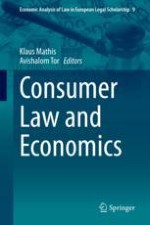2021 | OriginalPaper | Chapter
Ex-Post Fairness Controls and Contract Design: The Spanish Experience
Authors : Fernando Gómez, Mireia Artigot
Published in: Consumer Law and Economics
Publisher: Springer International Publishing
Activate our intelligent search to find suitable subject content or patents.
Select sections of text to find matching patents with Artificial Intelligence. powered by
Select sections of text to find additional relevant content using AI-assisted search. powered by
